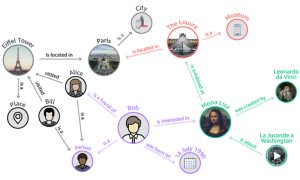Knowledge graph: Difference between revisions
Jump to navigation
Jump to search
No edit summary |
|||
| (5 intermediate revisions by the same user not shown) | |||
| Line 8: | Line 8: | ||
* Knowledge graphs have an underlying schema ([[ontology]] or [[concept model]]) for organising [[concept]]s within the network. | * Knowledge graphs have an underlying schema ([[ontology]] or [[concept model]]) for organising [[concept]]s within the network. | ||
=[[ | =[[Synonym]]s= | ||
* [[Concept]] model | * [[Concept]] model | ||
| Line 14: | Line 14: | ||
[[Superordinate concept]] is: | [[Superordinate concept]] is: | ||
* [[Directed graph]] | * [[Directed graph]] | ||
=Resources= | |||
Stardog. [https://www.stardog.com/knowledge-graph/ How Knowledge Graphs Work.] | |||
=[[Reference]]s= | =[[Reference]]s= | ||
[[Category:All]] | [[Category:All]] | ||
Latest revision as of 16:31, 30 December 2022
Definition
A knowledge graph is a directed labeled graph in which the labels have well-defined meanings. [1]
Notes
- A Knowledge Graph is a flexible, reusable data layer used for answering complex queries across data silos.
- Knowledge graphs have an underlying schema (ontology or concept model) for organising concepts within the network.
Synonyms
- Concept model
Generic relations
Resources
Stardog. How Knowledge Graphs Work.
References
- ↑ Stanford. What is a Knowledge Graph.
